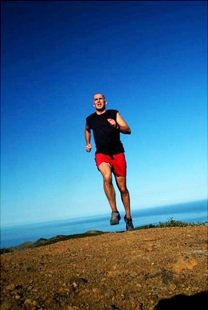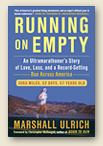 “Marsh, honey, you’re running in your sleep again. Rest, sweetheart.” —Heather Ulrich, late one night during Marshall’s dramatic race across America “Marsh, honey, you’re running in your sleep again. Rest, sweetheart.” —Heather Ulrich, late one night during Marshall’s dramatic race across America
THE PROBLEM WITH THE BEST MARSHALL ULRICH STORIES is you never seem to hear them from Marshall Ulrich. He’s one of America’s greatest living adventurers and an expert without peer in human endurance, yet most Ulrich lore is passed along only by spoken word, making him a hero in other people’s Greatest Hits collections and a figure who comes across less like a real human and more like a mythological creature who ferries drowning men to shore before vanishing back into the sea. Travel around the Rocky Mountains or Death Valley at the right time of year—the right time, of course, being 4 a.m. in a hailstorm or high noon on a 120-degree day—and you’ll find endurance daredevils testing themselves against tales like these:
“You know the Pikes Peak Marathon? Thirteen miles straight up the side of a 14,000-foot mountain and thirteen miles back down again. You can’t do Pikes and the Leadville Trail 100 in the same year when they’re both on the same weekend, because you’d never be able to complete the hundred and then get to Colorado Springs in time, much less do the marathon. Then one summer, just as they’re counting down for the start at Pikes, a Datsun comes roaring up and screeches to a stop. This guy comes tumbling out, all caked in trail dust and grime. He jumps into the race just as the gun booms. Marshall had finished the hundred-mile Leadville race in under twenty-four hours, then floored the three-hour drive to Colorado Springs because the race director was a buddy of his. No one else has ever done it. I don’t think anyone else has even tried.”
“Know how Marsh spent his fiftieth birthday? Raising money for orphans by running across Death Valley—four times in a row. That’s nearly six hundred miles, back and forth across the hottest place on earth and up and down Mount Whitney. He challenged the course, both the desert and the mountain, another time by stuffing his gear and water in a hotdog cart so he could run across Death Valley alone.”
My favorite is one I heard from Frank McKinney, a Florida real estate developer with heavy-metal hair and an ocean-view treehouse for an office. McKinney wasn’t a runner—he preferred tennis, if anything—and he knew nothing about mountains or desert heat. But he found out about the Badwater Ultramarathon and got the idea that running 135 miles in awful desert heat would be kind of a kick. Somehow he got in, so off he set on race day, trotting through the salt flats in his head-to-toe sun whites. By mile seventy-five or so, McKinney had gotten the fun smacked out of him; head spinning, muscles knotting, he was a panting mess by the side of the road. He lay in the shade of his support team’s van, mustering the strength to get inside and head the hell home. He wasn’t just exhausted and overheated—he was scared. People die in Death Valley all the time, their brains slowly convection-cooking inside their skulls.
And that’s when a shadow blocked out the sun. A man stood over him, then squatted down. His voice was calm, quiet, light-hearted. He wasn’t trying to buck McKinney up so much as talk the race down. Not a big deal, he told McKinney; get some water down your throat, maybe some tapioca pudding, and then look around. Isn’t this place awesome? How many other people get a chance to see this? We’re a couple of lucky guys, you and I ... did you finish that pudding? Good, try a banana...
The year before, Marshall had come straight to Badwater after reaching the top of Mount Everest. Marshall had always wanted to make the climb, and the only window had opened before Badwater. Rather than choosing between the challenges of a lifetime for anyone else, he’d once again decided to just live a little harder than anyone else. He knew the consequences: No matter who you are, you’re half the man you were by the time you get down from Everest. You’ve lost at least one-third of your muscle mass, and count yourself lucky if you’re not dehydrated, frostbitten, malnourished, and snowblind. Somehow, Marshall had managed to hustle his muscle-depleted self off the Himalayas and then, for good measure, to Russia to reach the summit of Mount Elbrus before returning halfway around the globe again to complete Badwater.
The year he met Frank McKinney was mild by Marshall’s standards; all he’d done was complete the Seven Summits, including climbing Mount Vinson in Antarctica, before coming here to squat on 200-degree asphalt with some guy who really wished he’d go away.
Marshall chatted with McKinney for an hour. A full hour, in the middle of a race that he’d won four times and exactly at a time when he should have been worrying about title number five instead of teaching Badwater 101 to an inexperienced freshman. But it worked; bit by bit, Frank McKinney began to feel better. He got to his feet and tested his legs. Not totally like wet newspaper. He began to shuffle, then jog, then run—and he kept going until he crossed the finish line more than a day later.
When I finally got the chance to ask Marshall about it, I had one question: “Why?” Every second you spend under the Death Valley sun increases your risk of ending up in the hospital with an emergency IV in your arm, and no one knew that better than Marshall. Once, he’d watched Lisa Smith-Batchen, the super-talented desert specialist and a former winner of a six-day race across the Sahara, get pulled from Badwater and rushed to the ER. So why was he risking his race—potentially, his life—for this guy?...
(Continued in Running on Empty:
An Ultramarathoner's Story of Love, Loss,
and a Record-setting Run Across America)
|
|


 “Marsh, honey, you’re running in your sleep again. Rest, sweetheart.”
“Marsh, honey, you’re running in your sleep again. Rest, sweetheart.”